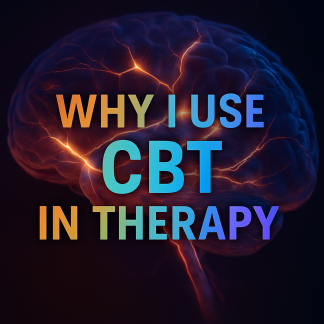🧠 Why I Use CBT in Therapy—And How It Can Help You Too
"I know it’s irrational, but I can’t stop thinking about it.”
That sentence—spoken in one form or another—has echoed through the therapy room more times than I can count.
Whether it’s overthinking, self-doubt, a fear of failure, or spirals of guilt and worry, Cognitive Behavioural Therapy (CBT) offers a proven way to break the cycle.
But CBT isn't a one-size-fits-all method. It’s a tool—one of several—that I integrate into my therapeutic work at Relational Psychotherapy to help people move from stuckness to clarity.
🧩 What Is CBT—And Why Do Therapists Use It?
CBT is one of the most researched and widely practiced forms of therapy. Developed in the 1960s by Aaron Beck, CBT is based on a simple but powerful idea:
Our thoughts, feelings, and behaviours are all connected. Change one, and you can influence the others.
Numerous studies, including those cited by the National Institute for Health and Care Excellence (NICE), have shown CBT to be particularly effective for anxiety, depression, PTSD, and more.
But evidence alone isn’t why I use CBT—it’s because I’ve seen it work.
🧍♀️ Real Examples from My Work
Case 1: The Inner Critic
A client I worked with—let’s call her Emma—was caught in a loop of negative self-talk. “I’m not good enough” ran like background music in her mind. Through CBT, we identified core beliefs that had formed early in life, gently challenged them with evidence, and practiced building new, more balanced thoughts.
Emma began to notice how her assumptions shaped her feelings and behaviours—and began choosing differently.
Case 2: Fear of Failure
Another client, a high-performing professional, was crippled by perfectionism. Every task felt like a test. We mapped his "all-or-nothing" thinking using a CBT thought record and worked to reframe failure not as a threat, but as part of growth. CBT gave him a roadmap to resilience.
🔍 Why I Blend CBT With Other Approaches
I don’t believe in just using single approaches in therapy.
As a trauma specialist trained in EMDR, hypnotherapy, and integrative counselling, I use CBT selectively—where it supports a deeper process of healing and growth.
CBT is great for skill-building, pattern-breaking, and helping clients develop agency in their lives. But it works best when used relationally, with empathy and flexibility.
In my work, CBT becomes a co-pilot—not the driver. It gives structure when we need it, and tools clients can take home and use between sessions.
🧪 The Research Speaks
CBT has been extensively studied, with meta-analyses consistently showing its effectiveness:
-
A 2018 review published in Psychological Bulletin found CBT significantly more effective than placebo or no treatment in anxiety and mood disorders.
-
The NHS endorses CBT as a frontline treatment for depression and anxiety, given its short-term, results-oriented nature.
Still, therapy is more than technique—it’s relationship. And CBT is most powerful when it’s delivered in a safe, collaborative space where your story is honoured.
🛠 Try This: The Thought-Feeling-Behaviour Loop
One of the simplest (and most eye-opening) CBT exercises is the T-F-B Loop.
Step 1: Notice a situation that triggered strong emotion.
Example: “I didn’t get a text back.”
Step 2: Ask yourself—what was the automatic thought?
“They’re ignoring me. I must have said something wrong.”
Step 3: What feeling followed?
Anxious, rejected, angry.
Step 4: What action did you take (or not take)?
Withdrew, ruminated, didn’t reach out again.
Now, gently challenge that thought. Could there be another explanation?
“Maybe they’re busy. Maybe it wasn’t personal.”
This tiny shift can start a chain reaction—changing how you feel and act in future situations.
🪴 Why Therapy with Me Might Be Right for You
At Relational Psychotherapy, I won’t just hand you a worksheet and send you on your way. Together, we’ll explore the patterns, past experiences, and protective beliefs that shape your inner world—using CBT as one tool in a wider, compassionate toolkit.
If you're ready to move beyond surface-level fixes and explore what real change looks like, let’s talk.
Your mind is powerful. CBT helps you use that power—rather than be ruled by it.
📩 To find out more about working together, visit www.jon-rowe.com or drop me a message to arrange a free 20-minute consultation.
Love & Light Jon

